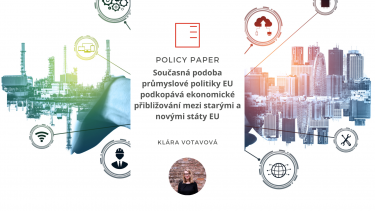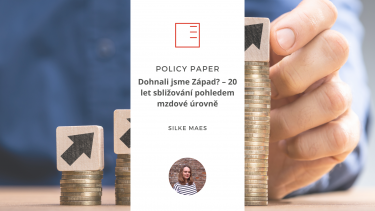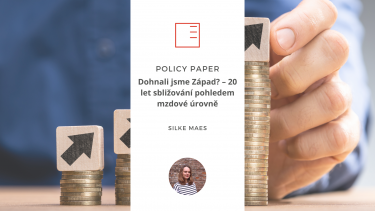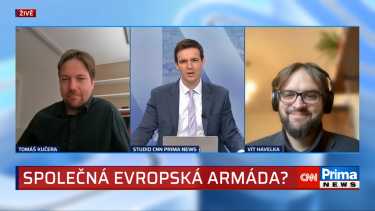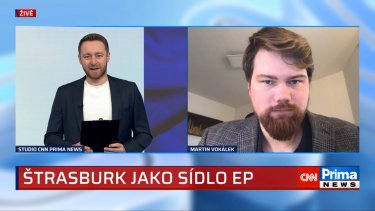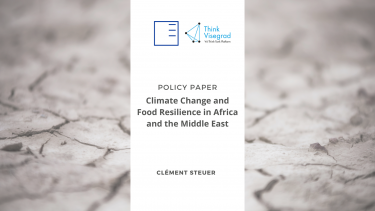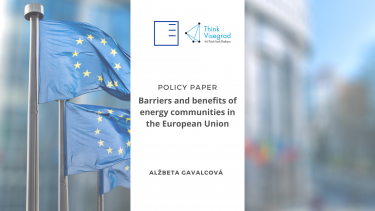Policy paper | Current EU industrial policy undermines economic convergence between old and new EU countries
The post-communist states of Central and Eastern Europe, including the Czech Republic, joined the European Union at the height of globalisation and the dominance of the so-called Washington Consensus policies. However, the global economic crisis of 2008 showed shortly afterwards that these policies had their limits. Read more in Klára Votavová's Policy Pepeu.
Show morePolicy paper | Současná podoba průmyslové politiky EU podkopává ekonomické přibližování mezi starými a novými státy EU
Postkomunistické státy střední a východní Evropy, včetně České republiky, vstupovaly do Evropské unie v době vrcholné globalizace a dominance politik takzvaného Washingtonského konsensu. Globální ekonomická krize roku 2008 však krátce poté ukázala, že tyto politiky mají svoje limity. Více se dočtete v Policy Pepeu Kláry Votavové.
Show morePolicy paper | Have we caught up with the West? - 20 years of convergence through the lens of wage levels
This year, the EU marks the anniversary of the biggest wave of enlargement in its history, when the Czech Republic joined the Union along with nine other Central and Eastern European countries. One of the main promises associated with enlargement was that the new Member States would catch up with Western Europe in terms of living standards. Read more in Silke Maes' policy paper.
Show morePolicy paper | Dohnali jsme Západ? – 20 let sbližování pohledem mzdové úrovně
Letos si EU připomíná výročí největší vlny rozšiřování v historii, kdy do Unie vstoupila Česká republika spolu s dalšími devíti zeměmi střední a východní Evropy. Jedním z hlavních slibů spojeným s rozšířením přitom bylo, že nové členské státy doženou západní Evropu v životní úrovni. Více se dočtete v policy paperu Silke Maes.
Show moreCNN Prima News | The European Army and the position of the Defense Commissioner
The next European Commission should have a new Commissioner for Defense. There is speculation that this position could go to the Czech Republic. However, some European politicians, such as French President Emmanuel Macron, are calling directly for the creation of European army. But what are the pitfalls of the project? Vít Havelka, a research fellow at EUROPEUM Institute, talked about the usefulness and possibilities for CNN Prima News.
Show more
CNN Prima News | Two plenary session locations of the European Parliament
The MEPs discussed the difficulty of changing the seat of the European Parliament, which periodically moves from Belgium to France. Most agreed that they would welcome if this movement was canceled. However, France would probably veto such a change in the treaties. What are the arguments for and against moving the European Parliament periodically? Is there any way out of this problem, or will Strasbourg's role remain the same for decades to come? Martin Vokálek, Director of EUROPEUM Institute for European Policy, commented for CNN Prima News on the issue.
Show more
Policy Paper | Climate Change and Food Resilience in Africa and the Middle East
Russia's war in Ukraine has destabilised supply chains and strained food systems in Africa and the Middle East, highlighting their vulnerability and the need to increase their resilience. Writes Clément Steuer, Senior Research Fellow at the Institute of International Relations Prague.
Show morePolicy Paper | Climate Change and Food Resilience in Africa and the Middle East
Ruská válka na Ukrajině destabilizovala dodavatelský řetězec a zatížila potravinové systémy Afriky a Blízkého východu, což zdůraznilo jejich zranitelnost a potřebu zvýšit jejich odolnost. Píše Clément Steuer, seniorní výzkumník v Ústavu pro mezinárodní vztahy v Praze.
Show morePolicy Paper | Barriers and benefits of energy communities in the European Union
Energy communities are an effective means to decentralize and renew our energy systems with sustainable solutions as they are usually based on renewable energy. They have already started emerging in 1970´s, yet there has been a significant increase in their development only in recent years, also in terms of their introduction into the EU legislation. Especially in Western and Northern European countries the concept already enjoys vast popularity. On the other hand, in Central and Eastern European countries (further referred to as CEE) energy communities are only beginning to emerge. The policy brief (based on literature and interviews with various stakeholders ) examines the benefits energy communities may bring, and more importantly, the main obstacles remaining in their way for greater evolution in the CEE region – and especially Visegrad countries (V4). As these initiatives progress, sharing the best practices will ensure the success of the community energy in the energy transition. Writes Alžbeta Gavalcová.
Show morePolicy Paper | Barriers and benefits of energy communities in the European Union
Energetické komunity jsou účinným prostředkem decentralizace a obnovy našich energetických systémů pomocí udržitelných řešení, protože jsou obvykle založeny na obnovitelné energii. Začaly se objevovat již v 70. letech 20. století, avšak k jejich výraznému rozvoji došlo až v posledních letech, a to i z hlediska jejich zavedení do legislativy EU. Zejména v zemích západní a severní Evropy se tato koncepce již těší velké oblibě. Naproti tomu v zemích střední a východní Evropy (dále jen SVE) se energetická společenství teprve začínají vytvářet. Tento politický brief (založený na literatuře a rozhovorech s různými zúčastněnými stranami ) zkoumá výhody, které mohou energetická společenství přinést, a především hlavní překážky, které jim stále stojí v cestě k většímu rozvoji v regionu střední a východní Evropy - a zejména v zemích Visegrádské skupiny (V4). Jak tyto iniciativy postupují, sdílení osvědčených postupů zajistí úspěch komunitní energetiky v energetickém přechodu. Píše Alžbeta Gavalcová.
Show moreStaroměstské náměstí 4/1
Prague 1 - Staré Město
110 00
tel.: +420 212 246 552
email: europeum@europeum.org
https://www.europeum.org
